
Martin Jung
@martinjung.eu
Researcher at @iiasa.ac.at | LA & Fellow @ipbes.net | AE @consbiog.bsky.social | #macroecology | #conservation | #biodiversity | #remotesensing | #systemsthinking | https://www.martinjung.eu/
Fixing bugs and saving ducks 🦆
Fixing bugs and saving ducks 🦆
Reposted by Martin Jung
🌍 Interested in the 2026 IIASA Young Scientists Summer Program (YSSP)? Join our #YSSP26 Application Webinar for Europe & Asia to learn how to prepare a strong application and hear from alumni.
🗓 19 Nov 2025 | 1-2pm CET
📩 Register by 17 Nov: yssp.admin@iiasa.ac.at
▶️ iiasa.ac.at/early-career...
🗓 19 Nov 2025 | 1-2pm CET
📩 Register by 17 Nov: yssp.admin@iiasa.ac.at
▶️ iiasa.ac.at/early-career...

November 7, 2025 at 2:48 PM
🌍 Interested in the 2026 IIASA Young Scientists Summer Program (YSSP)? Join our #YSSP26 Application Webinar for Europe & Asia to learn how to prepare a strong application and hear from alumni.
🗓 19 Nov 2025 | 1-2pm CET
📩 Register by 17 Nov: yssp.admin@iiasa.ac.at
▶️ iiasa.ac.at/early-career...
🗓 19 Nov 2025 | 1-2pm CET
📩 Register by 17 Nov: yssp.admin@iiasa.ac.at
▶️ iiasa.ac.at/early-career...
Reposted by Martin Jung
Just learned that you can boost the usefulness of your Google search results massively by adding
-ai
to your query.
You're welcome.
-ai
to your query.
You're welcome.
October 24, 2025 at 2:27 PM
Just learned that you can boost the usefulness of your Google search results massively by adding
-ai
to your query.
You're welcome.
-ai
to your query.
You're welcome.
Chapter 3 of the @ipbes.net Nexus assessment, which I have contributed to, has now been openly released.
We assessed the evidence on how future nexus interactions accross the nexus will likely behave under different scenarios.
doi.org/10.5281/zeno...
@iiasa.ac.at
We assessed the evidence on how future nexus interactions accross the nexus will likely behave under different scenarios.
doi.org/10.5281/zeno...
@iiasa.ac.at
IPBES Nexus Assessment: Chapter 3 – Future interactions across the nexus
Chapter 3: Future interactions across the nexus of the Thematic Assessment Report on the Interlinkages among Biodiversity, Water, Food and Health of the Intergovernmental Science-Policy Platform on Bi...
doi.org
October 20, 2025 at 4:38 PM
Chapter 3 of the @ipbes.net Nexus assessment, which I have contributed to, has now been openly released.
We assessed the evidence on how future nexus interactions accross the nexus will likely behave under different scenarios.
doi.org/10.5281/zeno...
@iiasa.ac.at
We assessed the evidence on how future nexus interactions accross the nexus will likely behave under different scenarios.
doi.org/10.5281/zeno...
@iiasa.ac.at
Reposted by Martin Jung
We're proud to have supported this effort to reassess the butterflies to Europe, but the results are sobering: Mounting risks threaten survival of wild European pollinators – IUCN Red List iucncongress2025.org/newsroom/all...

Mounting risks threaten survival of wild European pollinators – IUCN Red List
Abu Dhabi, United Arab Emirates, 11 October 2025 (IUCN) – Nearly 100 additional wild bee species in Europe have been classified as threatened in a new assessment for the IUCN Red List of Threatened Sp...
iucncongress2025.org
October 12, 2025 at 9:07 AM
We're proud to have supported this effort to reassess the butterflies to Europe, but the results are sobering: Mounting risks threaten survival of wild European pollinators – IUCN Red List iucncongress2025.org/newsroom/all...
Reposted by Martin Jung
Well, it's official. After our paper last year (onlinelibrary.wiley.com/doi/full/10....), the Slender-billed Curlew is officially declared Extinct today.
Scientists dream of describing new species, not writing their obituary and epitaph, knowing that they are gone forever #ornithology
Scientists dream of describing new species, not writing their obituary and epitaph, knowing that they are gone forever #ornithology

October 10, 2025 at 8:54 AM
Well, it's official. After our paper last year (onlinelibrary.wiley.com/doi/full/10....), the Slender-billed Curlew is officially declared Extinct today.
Scientists dream of describing new species, not writing their obituary and epitaph, knowing that they are gone forever #ornithology
Scientists dream of describing new species, not writing their obituary and epitaph, knowing that they are gone forever #ornithology
Reposted by Martin Jung
Earth lost a conservationist and scientist like no other, and I am saddened profoundly by this news. Dr. Jane Goodall changed lives and attitudes about conservation and respect for nature wherever she went. A gifted leader in every way.
www.theglobeandmail.com/world/articl... 🧪
www.theglobeandmail.com/world/articl... 🧪

Jane Goodall, primate expert and conservationist, dies aged 91
Goodall was a pioneer in her field, both as a female scientist in the 1960s and for her work studying the behavior of primates
www.theglobeandmail.com
October 1, 2025 at 6:58 PM
Earth lost a conservationist and scientist like no other, and I am saddened profoundly by this news. Dr. Jane Goodall changed lives and attitudes about conservation and respect for nature wherever she went. A gifted leader in every way.
www.theglobeandmail.com/world/articl... 🧪
www.theglobeandmail.com/world/articl... 🧪
New spatial-explicit pan-European opportunity cost layers now out from the @naturaconnect.bsky.social project 🎉
Spencer et al. Opportunity cost estimates for spatial conservation prioritisation across terrestrial Europe. Sci Data 12, 1583 (2025). doi.org/10.1038/s415...
Spencer et al. Opportunity cost estimates for spatial conservation prioritisation across terrestrial Europe. Sci Data 12, 1583 (2025). doi.org/10.1038/s415...

Opportunity cost estimates for spatial conservation prioritisation across terrestrial Europe - Scientific Data
Scientific Data - Opportunity cost estimates for spatial conservation prioritisation across terrestrial Europe
doi.org
September 30, 2025 at 6:48 AM
New spatial-explicit pan-European opportunity cost layers now out from the @naturaconnect.bsky.social project 🎉
Spencer et al. Opportunity cost estimates for spatial conservation prioritisation across terrestrial Europe. Sci Data 12, 1583 (2025). doi.org/10.1038/s415...
Spencer et al. Opportunity cost estimates for spatial conservation prioritisation across terrestrial Europe. Sci Data 12, 1583 (2025). doi.org/10.1038/s415...
Reposted by Martin Jung
Shifting the baseline for waterbird and seabird conservation in Europe: risk assessment over one century
link.springer.com/article/10.1...
🌍 🧪 🦤 #Ornithology
link.springer.com/article/10.1...
🌍 🧪 🦤 #Ornithology

Shifting the baseline for waterbird and seabird conservation in europe, risk assessment over one century - Biodiversity and Conservation
European waterbird and seabird populations have been threatened by anthropogenic activities for decades. Effective strategies are needed to restore both populations and their habitats. However, the temporal period used to define the state of reference when setting restoration targets requires careful considerations to avoid the risk of shifting baseline. A risk of shifting baseline occurs if a population decreases before the time period used to set a baseline. In Europe, most bird monitoring schemes started after the 1970s, yet significant changes in population trends were already reported earlier in the 20th century. We assessed the risk of shifting baseline for 88 out of 170 waterbird and seabird species breeding in Europe. Building on historical ecology, we reconstructed population trends between 1900 and 2018 from information collected in both historical literature and monitoring scheme reports. Historical trends confirm variations in population trends for several waterbird and seabird species over the period 1900-1970, with 35 decreasing species, 38 fluctuating species, 15 increasing species and 82 species with unknown trends. A high risk of shifting baseline was identified for 28 species, for which restoration targets must consider historical trends spanning at least a century. The risk was low for 12 species, probably low for 41 species, probably high for 7 species and uncertain for 82 species. Our study highlights the crucial role of historical data collected prior to the large-scale implementation of standardized abundance monitoring, as it allows for the identification of appropriate baselines to guide the restoration of waterbird and seabird breeding populations.
link.springer.com
September 29, 2025 at 2:41 PM
Shifting the baseline for waterbird and seabird conservation in Europe: risk assessment over one century
link.springer.com/article/10.1...
🌍 🧪 🦤 #Ornithology
link.springer.com/article/10.1...
🌍 🧪 🦤 #Ornithology
Reposted by Martin Jung
Just out in PNAS!
We used multi-taxon data to model virtual forest landscapes.
Forest withdrawn from timber harvesting are needed in a much higher share than they currently are in Europe, and extensive forests contribute less than expected to multi-taxon diversity.
www.pnas.org/doi/10.1073/...
We used multi-taxon data to model virtual forest landscapes.
Forest withdrawn from timber harvesting are needed in a much higher share than they currently are in Europe, and extensive forests contribute less than expected to multi-taxon diversity.
www.pnas.org/doi/10.1073/...

Sustainable forest planning: Assessing biodiversity effects of Triad zoning based on empirical data and virtual landscapes | PNAS
The Triad framework seeks to balance the economic and ecological functions in forested
landscapes by combining intensively, extensively, and unmana...
www.pnas.org
September 23, 2025 at 12:58 PM
Just out in PNAS!
We used multi-taxon data to model virtual forest landscapes.
Forest withdrawn from timber harvesting are needed in a much higher share than they currently are in Europe, and extensive forests contribute less than expected to multi-taxon diversity.
www.pnas.org/doi/10.1073/...
We used multi-taxon data to model virtual forest landscapes.
Forest withdrawn from timber harvesting are needed in a much higher share than they currently are in Europe, and extensive forests contribute less than expected to multi-taxon diversity.
www.pnas.org/doi/10.1073/...
Reposted by Martin Jung
Trends in indirect drivers have an effect on both direct drivers and nexus elements.
-IPBES #NexusAssessment Report
Want to know more? Check the Summary for Policymakers already available in English: https://www.ipbes.net/nexus/media-release
-IPBES #NexusAssessment Report
Want to know more? Check the Summary for Policymakers already available in English: https://www.ipbes.net/nexus/media-release

September 18, 2025 at 5:49 AM
Trends in indirect drivers have an effect on both direct drivers and nexus elements.
-IPBES #NexusAssessment Report
Want to know more? Check the Summary for Policymakers already available in English: https://www.ipbes.net/nexus/media-release
-IPBES #NexusAssessment Report
Want to know more? Check the Summary for Policymakers already available in English: https://www.ipbes.net/nexus/media-release
Reposted by Martin Jung
The 8th European Congress for Conservation Biology will take place in Leiden, NL! They will explore how #biodiversity can be safeguarded effectively in the long term. First call is open now! Check out: eccb26leiden.eu/calls/ for more info, we are looking forward to your contributions!

September 15, 2025 at 3:31 PM
The 8th European Congress for Conservation Biology will take place in Leiden, NL! They will explore how #biodiversity can be safeguarded effectively in the long term. First call is open now! Check out: eccb26leiden.eu/calls/ for more info, we are looking forward to your contributions!
Extremely happy to announce that @iiasa.ac.at will host the first author meeting of the @ipbes.net Spatial Planning and Connectivity assessment.
iiasa.ac.at/news/sep-202...
iiasa.ac.at/news/sep-202...

IIASA to host first author meeting of IPBES Spatial Planning and Connectivity Assessment
IIASA will host the first author meeting of the upcoming Intergovernmental Science-Policy Platform on Biodiversity and Ecosystem Services (IPBES) Spatial Planning and Connectivity Assessment in Laxenb...
iiasa.ac.at
September 15, 2025 at 9:58 AM
Extremely happy to announce that @iiasa.ac.at will host the first author meeting of the @ipbes.net Spatial Planning and Connectivity assessment.
iiasa.ac.at/news/sep-202...
iiasa.ac.at/news/sep-202...
Reposted by Martin Jung
EXPOSED: Google's £33 million contract to push Israeli propaganda in the UK
Google's has run 39 Israeli government-paid-for ads on its platforms in the UK alone, trying to discredit reports on the Zionist's genocide in Gaza
www.thecanary.co/global/world...
Google's has run 39 Israeli government-paid-for ads on its platforms in the UK alone, trying to discredit reports on the Zionist's genocide in Gaza
www.thecanary.co/global/world...

EXPOSED: Google's £33 million contract to push Israeli propaganda in the UK
Google's has run 39 Israel government-bought ads on its platforms in the UK alone, trying to discredit reports on the genocide in Gaza
www.thecanary.co
September 5, 2025 at 8:41 AM
EXPOSED: Google's £33 million contract to push Israeli propaganda in the UK
Google's has run 39 Israeli government-paid-for ads on its platforms in the UK alone, trying to discredit reports on the Zionist's genocide in Gaza
www.thecanary.co/global/world...
Google's has run 39 Israeli government-paid-for ads on its platforms in the UK alone, trying to discredit reports on the Zionist's genocide in Gaza
www.thecanary.co/global/world...
Reposted by Martin Jung
Fresh off the press! Our perspective in @natrevbiodiv.nature.com discusses the wealth of information on biodiversity contained in historical sources, and its integration for long-term ecological knowledge and biodiversity conservation. A thread on the paper and what led to it:
rdcu.be/eEcIt
rdcu.be/eEcIt

September 5, 2025 at 1:53 PM
Fresh off the press! Our perspective in @natrevbiodiv.nature.com discusses the wealth of information on biodiversity contained in historical sources, and its integration for long-term ecological knowledge and biodiversity conservation. A thread on the paper and what led to it:
rdcu.be/eEcIt
rdcu.be/eEcIt
Small article out on projecting European potential natural vegetation types. Code and data available, and maybe useful for some :)
doi.org/10.1016/j.ec...
doi.org/10.1016/j.ec...
Redirecting
doi.org
September 5, 2025 at 7:07 AM
Small article out on projecting European potential natural vegetation types. Code and data available, and maybe useful for some :)
doi.org/10.1016/j.ec...
doi.org/10.1016/j.ec...
#IALE2025 is about to kickoff. Looking forward to learn more about the current state of the science. If you are there, don't miss my talk on Friday 😀
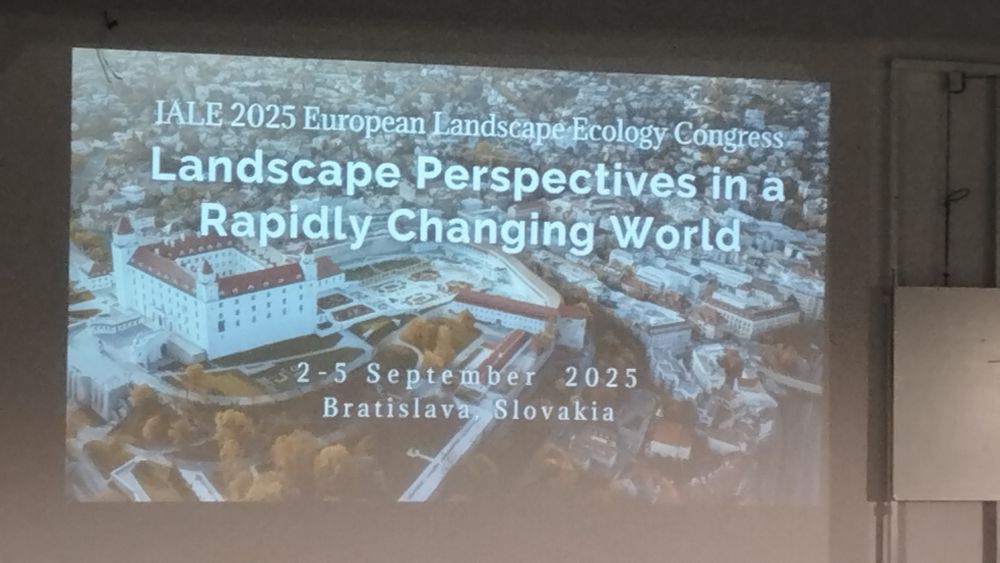
September 2, 2025 at 6:46 AM
#IALE2025 is about to kickoff. Looking forward to learn more about the current state of the science. If you are there, don't miss my talk on Friday 😀
Reposted by Martin Jung
Yikes - the land surrounding the Cerne Abbas Giant is up for sale!
Lot 1 is top-quality chalk downland bursting with wildflowers & butterflies - orchids, skippers… going for £950k. It absolutely needs to be preserved. Hope the NT or similar can buy
wdcdn.co/media/pdf/0f... wdcdn.co/media/pdf/0f...
Lot 1 is top-quality chalk downland bursting with wildflowers & butterflies - orchids, skippers… going for £950k. It absolutely needs to be preserved. Hope the NT or similar can buy
wdcdn.co/media/pdf/0f... wdcdn.co/media/pdf/0f...

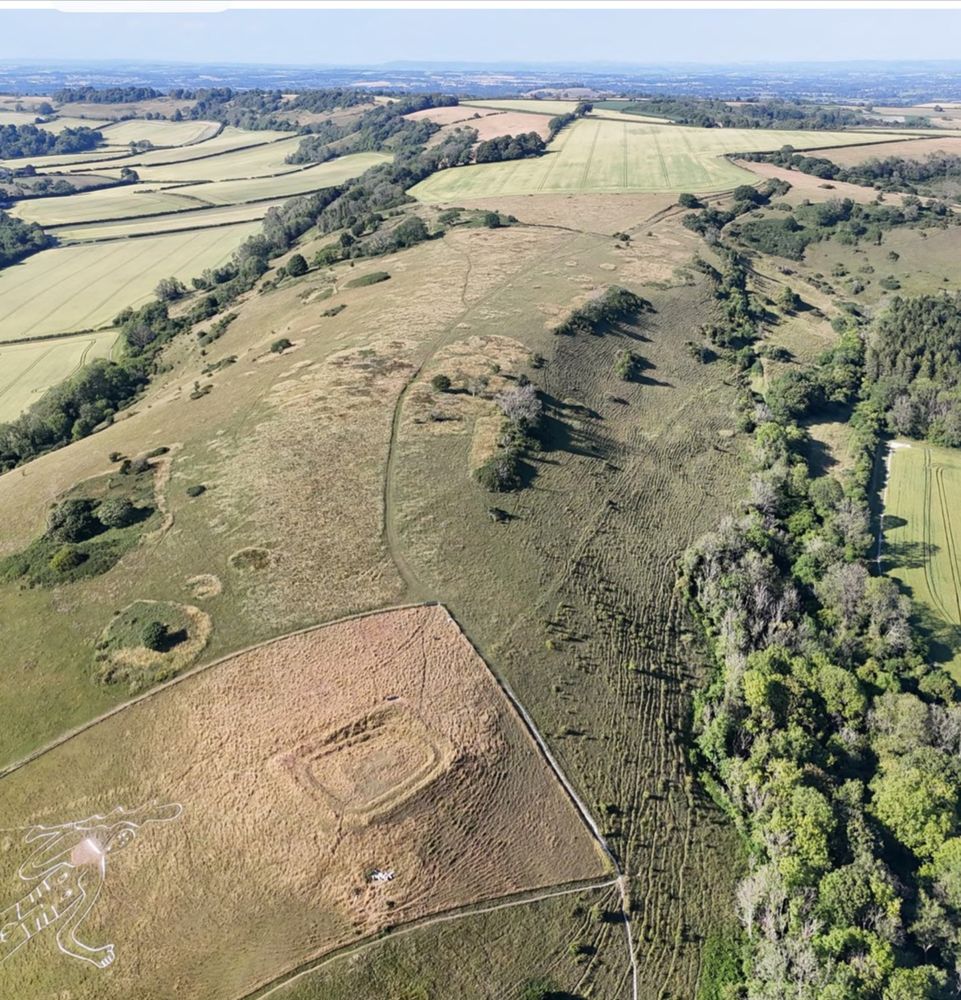
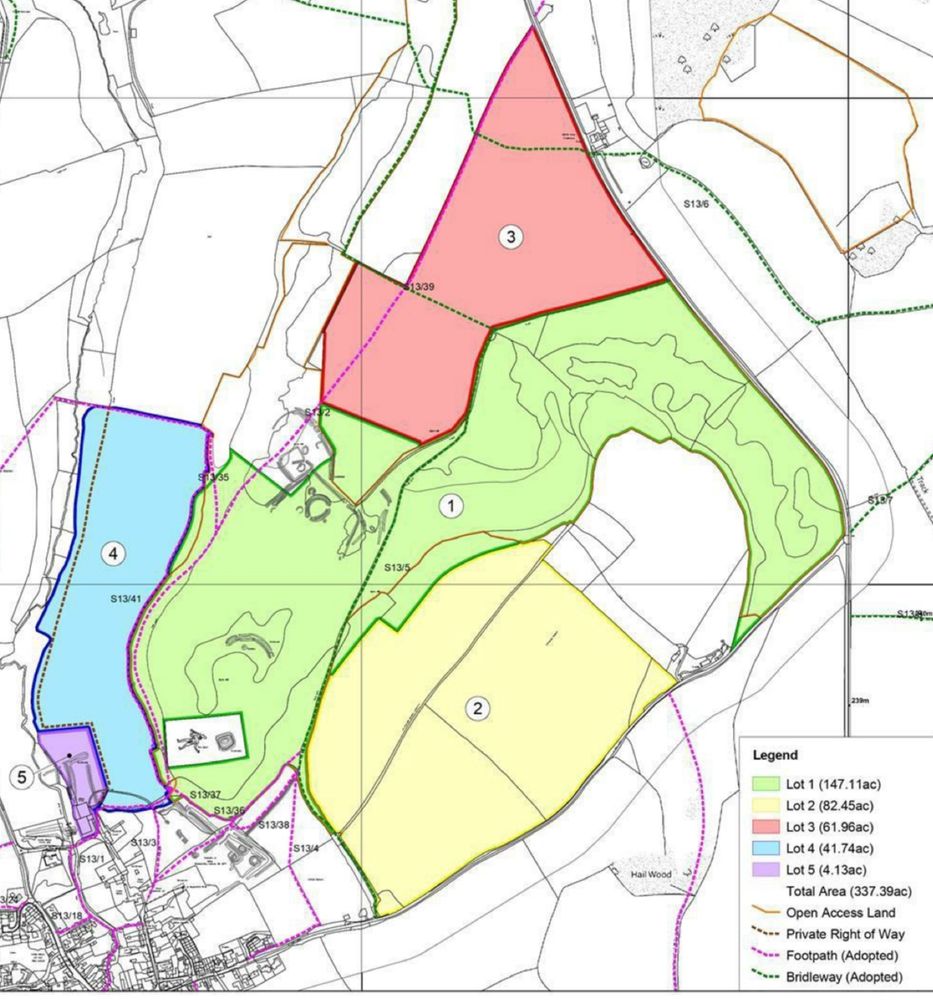
August 17, 2025 at 12:18 PM
Yikes - the land surrounding the Cerne Abbas Giant is up for sale!
Lot 1 is top-quality chalk downland bursting with wildflowers & butterflies - orchids, skippers… going for £950k. It absolutely needs to be preserved. Hope the NT or similar can buy
wdcdn.co/media/pdf/0f... wdcdn.co/media/pdf/0f...
Lot 1 is top-quality chalk downland bursting with wildflowers & butterflies - orchids, skippers… going for £950k. It absolutely needs to be preserved. Hope the NT or similar can buy
wdcdn.co/media/pdf/0f... wdcdn.co/media/pdf/0f...
Reposted by Martin Jung
📖Published📖
Authors introduce GECOT, an open-source command line tool for solving budget-constrained multispecies landscape connectivity optimization problems when measuring landscape connectivity with the probability of connectivity indicator 👇
buff.ly/uWrazth
Authors introduce GECOT, an open-source command line tool for solving budget-constrained multispecies landscape connectivity optimization problems when measuring landscape connectivity with the probability of connectivity indicator 👇
buff.ly/uWrazth
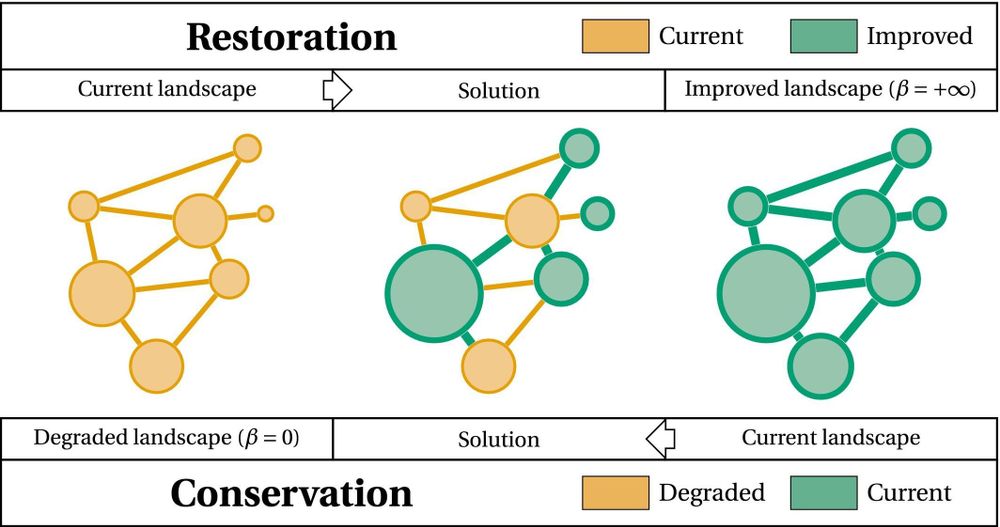
July 28, 2025 at 11:02 AM
📖Published📖
Authors introduce GECOT, an open-source command line tool for solving budget-constrained multispecies landscape connectivity optimization problems when measuring landscape connectivity with the probability of connectivity indicator 👇
buff.ly/uWrazth
Authors introduce GECOT, an open-source command line tool for solving budget-constrained multispecies landscape connectivity optimization problems when measuring landscape connectivity with the probability of connectivity indicator 👇
buff.ly/uWrazth
Reposted by Martin Jung
Shannon's H, Simpson's D, and Pielou's J are useless in ecology. Fitting data with a compound abundance distribution based on the geometric series is a better way to quantify variation – and to estimate species richness. New paper in Ecology Letters.
onlinelibrary.wiley.com/doi/10.1111/...
onlinelibrary.wiley.com/doi/10.1111/...
onlinelibrary.wiley.com
July 24, 2025 at 11:14 AM
Shannon's H, Simpson's D, and Pielou's J are useless in ecology. Fitting data with a compound abundance distribution based on the geometric series is a better way to quantify variation – and to estimate species richness. New paper in Ecology Letters.
onlinelibrary.wiley.com/doi/10.1111/...
onlinelibrary.wiley.com/doi/10.1111/...
Another assessment in line with our previous work emphasising the need to distinguish management when mapping forest cover, loss and gain www.nature.com/articles/s41...
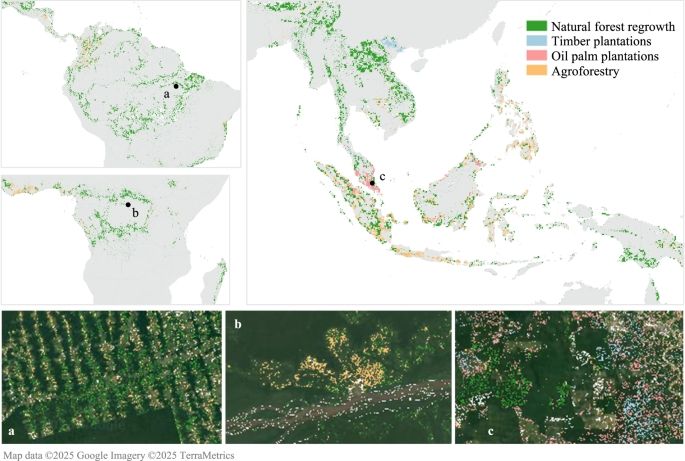
The importance of distinguishing between natural and managed tree cover gains in the moist tropics - Nature Communications
Tree cover gains in the moist tropics (1982–2015) were 56% naturally regenerated forests and 27% managed tree systems, with forest type influencing carbon recovery. Effective forest restoration requir...
www.nature.com
July 3, 2025 at 8:14 AM
Another assessment in line with our previous work emphasising the need to distinguish management when mapping forest cover, loss and gain www.nature.com/articles/s41...
Also just out: Our new review in @ecography.bsky.social on how ecological models tend to incorporate land use.
Reviewing and benchmarking ecological modelling practices in the context of land use
doi.org/10.1002/ecog...
Reviewing and benchmarking ecological modelling practices in the context of land use
doi.org/10.1002/ecog...
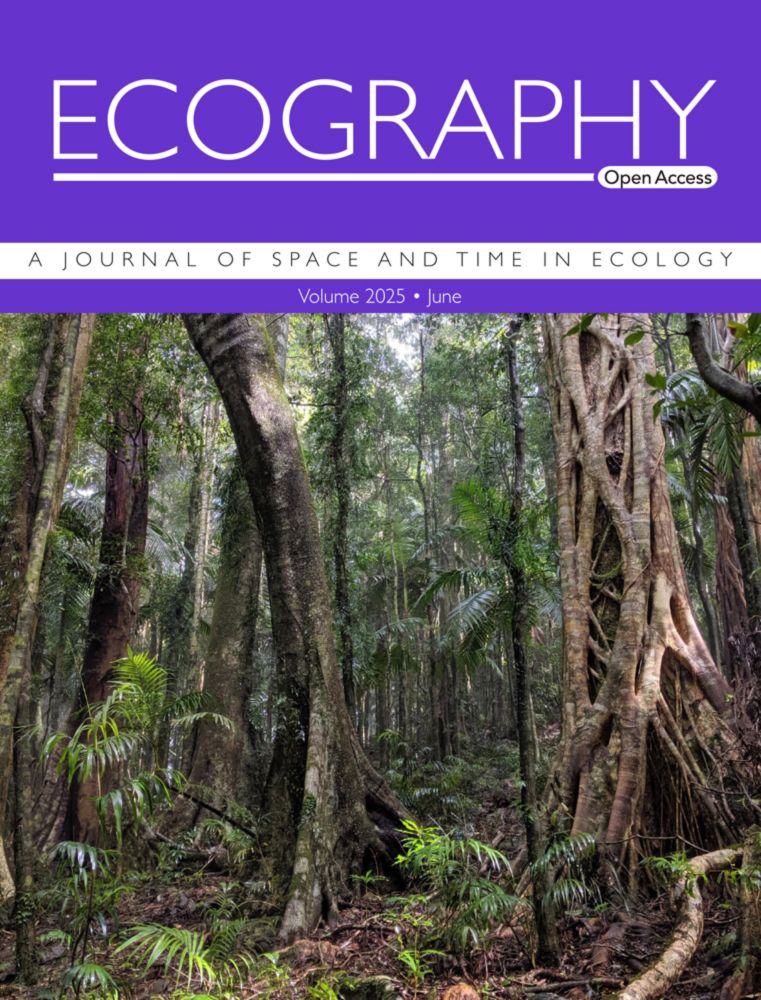
Reviewing and benchmarking ecological modelling practices in the context of land use
Despite habitat loss and degradation are the primary drivers of biodiversity loss, different conclusions have been drawn about the importance of land-use or land-cover (LULC) change for biodiversity....
doi.org
July 1, 2025 at 8:18 PM
Also just out: Our new review in @ecography.bsky.social on how ecological models tend to incorporate land use.
Reviewing and benchmarking ecological modelling practices in the context of land use
doi.org/10.1002/ecog...
Reviewing and benchmarking ecological modelling practices in the context of land use
doi.org/10.1002/ecog...
Systematic conservation planning (SCP) has been established as key approach to identify where conservation efforts are to be prioritized. But how can they be assessed, compared or interrogated 🧐 Here we present ODPSCP, a new open protocol for the intercomparison of SCP doi.org/10.1111/csp2... (1)
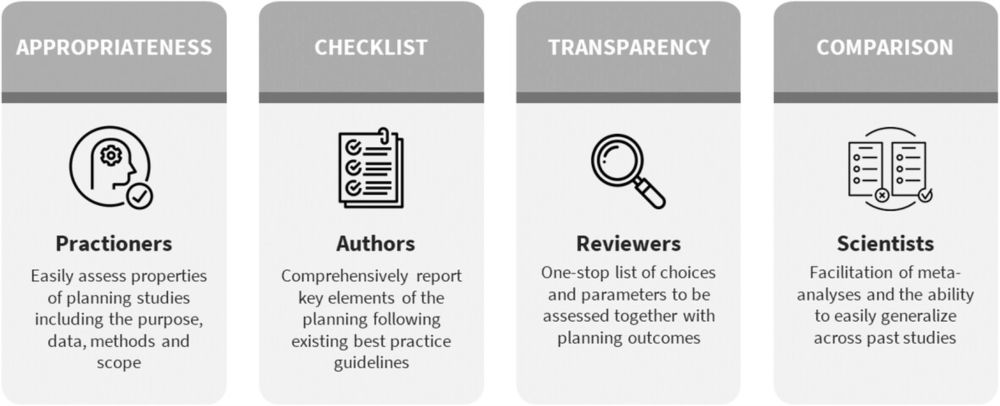
An interoperable and standardized protocol for reporting systematic conservation planning projects
A new standard protocol for contextualizing systematic conservation planning studies is presented and the potential benefits highlighted. By adopting such community reporting standards, scientists an...
doi.org
June 30, 2025 at 6:39 PM
Systematic conservation planning (SCP) has been established as key approach to identify where conservation efforts are to be prioritized. But how can they be assessed, compared or interrogated 🧐 Here we present ODPSCP, a new open protocol for the intercomparison of SCP doi.org/10.1111/csp2... (1)
Reposted by Martin Jung
Can Nature & People Thrive Together?
🌍🧑🌾🌽🌎🌴🐬🌏🚵♀️🍄🌐👍
An Aspirational Approach to Planetary Futures @nature.com.web.brid.gy
www.nature.com/articles/s41...
🌍🧑🌾🌽🌎🌴🐬🌏🚵♀️🍄🌐👍
An Aspirational Approach to Planetary Futures @nature.com.web.brid.gy
www.nature.com/articles/s41...
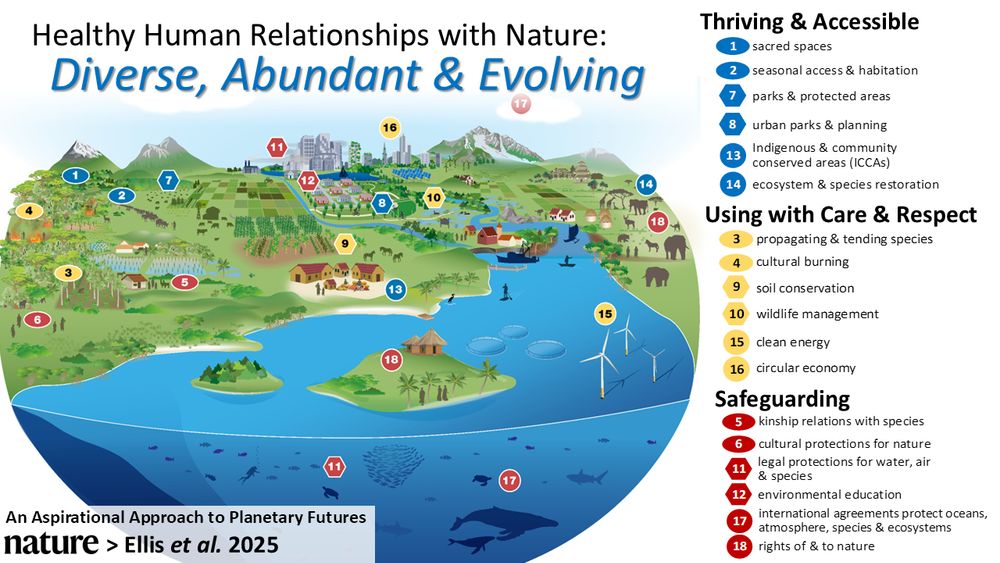
June 25, 2025 at 3:07 PM
Can Nature & People Thrive Together?
🌍🧑🌾🌽🌎🌴🐬🌏🚵♀️🍄🌐👍
An Aspirational Approach to Planetary Futures @nature.com.web.brid.gy
www.nature.com/articles/s41...
🌍🧑🌾🌽🌎🌴🐬🌏🚵♀️🍄🌐👍
An Aspirational Approach to Planetary Futures @nature.com.web.brid.gy
www.nature.com/articles/s41...
Interesting new paper on European conservation targets and land-use conflicts
Land of opportunities: aligning organic farming and conservation targets in Europe
doi.org/10.1080/0964...
Land of opportunities: aligning organic farming and conservation targets in Europe
doi.org/10.1080/0964...
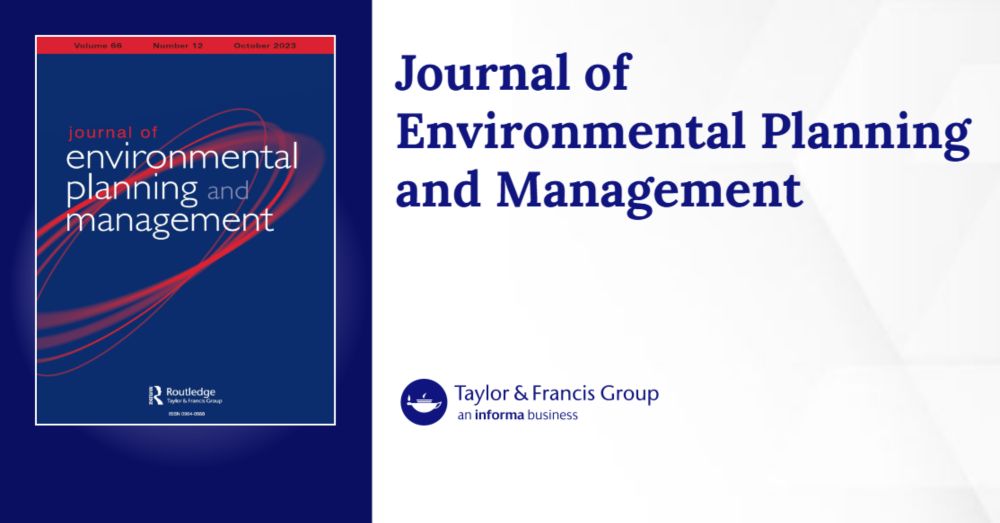
Land of opportunities: aligning organic farming and conservation targets in Europe
In the face of growing environmental challenges, the European Green Deal sets ambitious targets for 2030, including strictly protecting 10% of the EU’s land area and expanding organic farming to 25...
doi.org
June 17, 2025 at 2:54 PM
Interesting new paper on European conservation targets and land-use conflicts
Land of opportunities: aligning organic farming and conservation targets in Europe
doi.org/10.1080/0964...
Land of opportunities: aligning organic farming and conservation targets in Europe
doi.org/10.1080/0964...
Reposted by Martin Jung
In a new interdisciplinary Nature Climate Change Perspective paper, led by me, @lisgilmore and Rachael Shwom, we offer a critical perspective on #climate and social “tipping points.” 🎁: rdcu.be/d2gBC 🧵
‘Tipping points’ confuse and can distract from urgent climate action
Nature Climate Change - The tipping points framing is widely used in climate discussions but receives mixed feedback. This Perspective critiques it for oversimplifying the complexities of natural...
rdcu.be
December 3, 2024 at 3:59 PM
In a new interdisciplinary Nature Climate Change Perspective paper, led by me, @lisgilmore and Rachael Shwom, we offer a critical perspective on #climate and social “tipping points.” 🎁: rdcu.be/d2gBC 🧵

